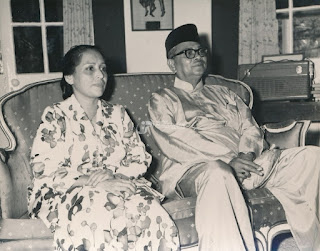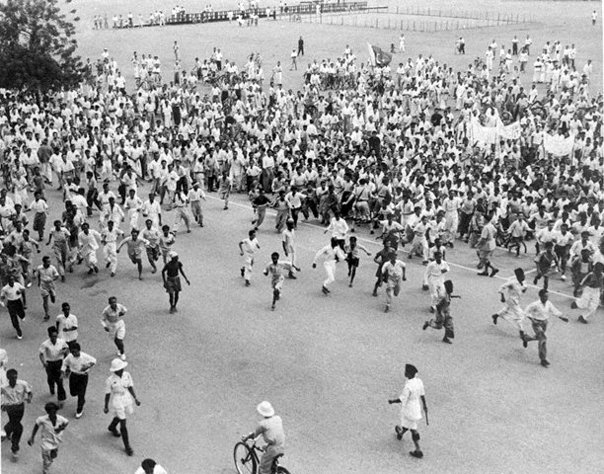TUNKU ABDUL RAHMAN PUTRA AL-HAJ
 |
| source: The Malaysia History |
 |
| source: TAR Biography |
In 1920, he left those idyllic days behind when he went to England to read law at St Catherine College in Cambridge. It was there that he began to develop anti-colonial feelings after being refused a place in the halls of residence twice, he said in his column for The Star which ran from 1974 to 1989.
“When I remonstrated with (one of his tutors) Rev Chaytor, he told me point blank, ‘The college was built for Englishmen. If I gave you a room to the exclusion of Englishmen they would not like it.’ ”
It was also at Cambridge that the Tunku got his first taste of politics when he became a student leader.
After he graduated, he returned to Kedah and was appointed as a district officer. Tunku recounted that while he was working in Kulim, he met an Indian astrologer who told him he would be Malaya’s first Prime Minister. “Everybody laughed,” reported the Tunku in his column, “including myself.”
But he had already taken the first steps towards that fate when he objected to being treated like a second-class citizen at Cambridge simply because he was Asian.
The following are some of the highlights in the career of a man who has arguably had the most influence on this country
LEADING UMNO
The Tunku was, of course, one of the main figures in Umno, the first political party to be registered in Malaya in 1946. The party was first led by Datuk Onn Jaafar but he resigned as president in 1951 when his proposal to open UMNO to non-Malays was rejected. The party then turned to the Tunku for leadership.
 |
| source: New Straits Time; Tunku's rise and fall |
The Tunku was, of course, one of the main figures in Umno, the first political party to be registered in Malaya in 1946. The party was first led by Datuk Onn Jaafar but he resigned as president in 1951 when his proposal to open UMNO to non-Malays was rejected. The party then turned to the Tunku for leadership.
It was a difficult time for the Tunku; he was worried about not being accepted by Umno members in Johor State and by members still loyal to the former president. And Onn had set up the multi-racial Parti Negara (National Party) that looked like it would compete with UMNO for Malay support. Then there was the other splinter party from UMNO, the Pan-Islamic Party of Malaya or PAS; it, too, was vying for Malay support.
All this on top of trying to deal with the communist threat – the Tunku testified to sleepless nights during much of his first term as UMNO president.
REACHING OTHER RACES
 |
| Evelyn Nesamanie Samuel presenting Tunku Abdul Rahman with a bouquet of flowers. SOURCE: The Star Online; Maintaining the Merdeka spirit for a multi-racial Malaysia |
In his speech introducing Malaya’s new Constitution to the Federal Legislative Council in 1956, the Tunku explained that British colonial policy had created a multi-racial polity that was divided. Now, for the first time in the history of Malaya, the races were united in their determination to achieve Merdeka, he said.
That unity was underlined by the forging of an alliance between Umno and MCA just before the first democratic election in Malaya, the Kuala Lumpur Municipal Election in 1952. The Umno-MCA Alliance won nine out of 12 seats.
In the first national election that followed in 1955, the Umno-MCA Alliance, now called the Alliance Party and led by the Tunku, won 51 out of 52 seats on the Federal Legislative Council; the Tunku was appointed Chief Minister.
He appointed a 10-member Cabinet that began the difficult process of negotiating for Malayan independence, countering the communist insurrection, setting up a transition administration and drawing up a Federal Constitution relevant to the disparate needs of the people of Malaya.
THE BALING TALKS
After winning the national election, the Tunku met with Malayan Communist Party Leader, Chin Peng in Baling, Kedah, to end the party’s armed insurrection. Chin Peng wanted the Malayan government to recognise his party’s legitimacy as a political entity.
 |
| source: Malaysia Outlook; Where to Draw the Line on 'Pendatang' |
After winning the national election, the Tunku met with Malayan Communist Party Leader, Chin Peng in Baling, Kedah, to end the party’s armed insurrection. Chin Peng wanted the Malayan government to recognise his party’s legitimacy as a political entity.
The talks ended in stalemate, however, and the need for independence under the Alliance formula of racial cooperation became even more urgent. The Tunku reiterated how important it was for Malaya to be independent through peaceful means and that he was determined to achieve this.
After winning the first national election decisively in 1955, the Tunku led a team of negotiators to London to discuss Malaya’s independence with the British Colonial Office.
The British had confidence in the Tunku because they felt he was a moderate. That the Tunku was a prince and that he enjoyed the respect of the Malay and non-Malay communities was also reassuring to the British.
The visit was followed by the creation of the Reid Commission that was set up to help prepare the Malayan Constitution.
Once the Tunku returned home, he made a series of speeches in villages, at clubs, political rallies, over the radio and before the legislative assembly to prepare Malayans for independence.
He once told his audience at the Selangor Club in Kuala Lumpur that he would speak for an hour five or six times a day to get his message across.
In these speeches the Tunku talked about national unity, Malay rights, standardising the Malay language, citizenship for all Malayans and the continued battle against the communists.
After much effort, in 1957 the Tunku achieved the single most important goal for Malaya: INDEPENDENCE.
THE FORMATION OF MALAYSIA
Once Malaya was stable and the Emergency – declared by the British in June 1948 to deal with the communist insurgency – ended in 1960, the Tunku began planning the expansion of the Malayan federation to include other British colonies in South-East Asia. The Cobbold Commission, set up to survey the situation in those colonies, recommended the formation of Malaysia with the inclusion of Singapore, Sarawak and Sabah. These colonies joined the federation in September 1963.
 |
| source: Malaysia, British, 1874 - 1957 |
Once Malaya was stable and the Emergency – declared by the British in June 1948 to deal with the communist insurgency – ended in 1960, the Tunku began planning the expansion of the Malayan federation to include other British colonies in South-East Asia. The Cobbold Commission, set up to survey the situation in those colonies, recommended the formation of Malaysia with the inclusion of Singapore, Sarawak and Sabah. These colonies joined the federation in September 1963.
 |
| SIGNATORIES: The Malaysia Agreement was signed by (from second left) Dato Abang Haji Openg, Tun Jugah, Dato Bandar Abang Mustapa, and P.E.H. Pike (not pictured) in London on July 12, 1963. source: Borneo Post Online; Formation of Malaysia |
And the Tunku was hailed as Bapa, or Father of, Malaysia.
INDONESIAN CONFRONTATION
Indonesian opposition to the formation of Malaysia, eventually known as the Confrontation, was first sparked off by the failed Brunei rebellion. Indonesia’s flamboyant president Sukarno claimed that Malaysia was a neo-colonial state devised to stifle newly-independent South-East Asia.
Indonesian opposition to the formation of Malaysia, eventually known as the Confrontation, was first sparked off by the failed Brunei rebellion. Indonesia’s flamboyant president Sukarno claimed that Malaysia was a neo-colonial state devised to stifle newly-independent South-East Asia.
There was also mounting opposition to Malaysia from Partai Komunis Indonesia.
The Philippines also opposed the inclusion of Sabah, formerly British North Borneo, in the Federation of Malaysia.
But the Tunku managed to successfully ward off these protests.
EXPULSION OF SINGAPORE
In 1965, Singapore’s outspoken leader Lee Kuan Yew, on his insistence of a Malaysian Malaysia, sparked a controversy between Kuala Lumpur and the island state. The outcome was the expulsion of Singapore from the federation.
In 1965, Singapore’s outspoken leader Lee Kuan Yew, on his insistence of a Malaysian Malaysia, sparked a controversy between Kuala Lumpur and the island state. The outcome was the expulsion of Singapore from the federation.
Singapore’s departure was a terrible blow to the Tunku’s efforts at building Malaysia. But at that time, Singapore’s continued presence in the federation might have destroyed the two-year-old polity.
Though the decision to expel Singapore was unpopular, the Tunku, as Lee recounted, was a gentleman who kept his word about not threatening Singapore.
 |
| source: History SG; Singapore separates from Malaysia |
Many first-generation Malaysian leaders saw their political careers end in the racial riots of May 13, 1969. The Tunku’s Alliance party, while successful in galvanising the nation in the first 10 years after its formation, could not cope with the mounting racial dissatisfaction in the nation. The euphoria of independence had exhausted its appeal.
There were economic and educational disparities particularly between the races. Coupled with the Alliance’s loss of its two-third majority in parliament, racial dissatisfaction led to riots.
Parliament was suspended and a state of Emergency declared. Tun Abdul Razak Hussein took over as Prime Minister and the Tunku retired gracefully from the government and Umno in 1971.
Although much criticised by the Malays for having lost touch with the grassroots, Malaysians of all races today acknowledge the Tunku’s immense contribution to the nation.
Chairman of the Malaysian Muslim Welfare Organisation (Perkim)
Though never overtly religious, the Tunku was a devout Muslim. His greatest contribution to Islam, apart from making it the religion of the federation, was the founding of Perkim, an organisation to help converts adjust to new lives as Muslims. The spirit of Perkim best reflects the Tunku’s vision of a country where race and religion are not impediments to citizens developing a sense of unity.
The People’s Father
The Tunku was never fearful of standing up for the rights of his fellow Malaysians. After the President of the Judiciary, Tun Salleh Abbas, was fired in 1988, the Tunku wrote the foreword to Salleh’s book and dealt frankly with what he thought was the abuse of executive powers over the judiciary.
And when Umno was de-registered in 1987, the Tunku supported Tengku Razaleigh Hamzah’s Semangat 46 party, even campaigning for it.
Few would know how the Tunku felt about Malaysia in his last years. The Malaysia of today might have grown beyond the vision of Bapa Malaysia but its heart is, hopefully, still defined by his beliefs and concerns.
Anyone who has ever met the Tunku will testify that he cared for the people of this country, whatever their status, race or religion. My brother met him and he will tell of the Tunku’s concern for even an ordinary Malaysian. The Tunku, who was visiting the hospital my brother was in, stopped by his bed and scolded him gently for being reckless on a motorcycle.
The Tunku believed in being the “happiest Prime Minister in the world.” Few politicians exhibit such idealism and even fewer are as loved and respected as the Tunku was because of it.
The Tunku died on Dec 6, 1990, at the age of 87.
Source: http://www.malaysiahistory.net/v2/?p=155
 |
| Tunku and his beloved grandchild, Sharifah Mengelara |
 |
| Tunku and his wife source: Potret Keluarga Perdana Menteri; Tunku Abdul Rahman |
 |
| Scanned Pix : Staric Date : 17/11/1988 Tunku Abdul Rahman (Declaring Independence) - National Day 1957 source: The Star; 57 years of Malaysia |
Source: http://www.malaysiahistory.net/v2/?p=155




Comments
Post a Comment